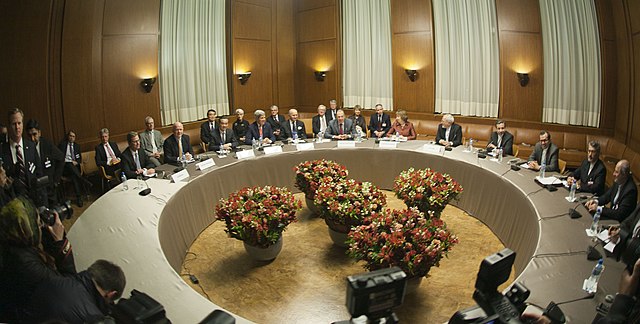Iran–European Union relations
European Union–Iran relations are the bilateral relations between Iran and the European Union (EU). The EU is Iran's largest trading partner, along with China and the United Arab Emirates. Trade with Iran is subject to the general EU import regime and the EU supports the goal of Iranian accession to the World Trade Organization (WTO). The EU has accused and criticized Iran for human rights violations, which led to diplomatic tensions, but both sides aim at improving and normalizing relations. Should Turkey's accession to the EU take place, Iran will border the European Union.
President of the European Parliament Martin Schulz meeting with Javad Zarif in Tehran (October 2015)
Mohammad Javad Zarif and Federica Mogherini holding talks in Tehran (April 2016)
The foreign ministers from each of the EU three and former High Representative Javier Solana in 2006.
The P5+1 refers to the UN Security Council's five permanent members ; namely China, France, Russia, the United Kingdom, and the United States; plus Germany. The P5+1 is often referred to as the E3+3 by European countries. It is a group of six world powers which, in 2006, joined together in diplomatic efforts with Iran with regard to its nuclear program.
The foreign ministers of the P5+1 nations, the High Representative of the European Union for Foreign Affairs, and the Iranian foreign minister in November 2013, when the Joint Plan of Action, an interim agreement on the Iranian nuclear program, was adopted in Geneva.
The ministers of foreign affairs of France, Germany, Iran, the United Kingdom and the United States as well as Chinese and Russian diplomats and the High Representative of the European Union for Foreign Affairs announcing an Iran nuclear deal framework in Lausanne on 2 April 2015. The framework deal became the basis for a final agreement, the Joint Comprehensive Plan of Action, which was agreed on 15 July 2015.
Last meetings before nuclear agreement






